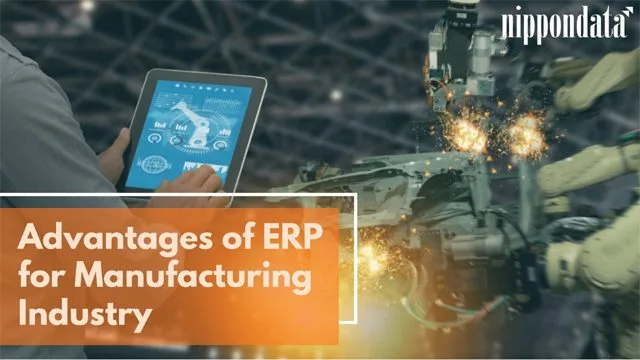7 Key Benefits of ERP for the Manufacturing Industry
ERP (Enterprise Resource Planning) software is not only used by large, enterprise-sized businesses but also by local, small- and medium-sized businesses. Almost all firms, regardless of their complexity or size, can get profit from ERP software that fulfils their needs. In contrast to other businesses, manufacturing organization has a very important role in an ERP.
Every industry has difficulties in achieving its objectives as a result of fierce competition and an increase in consumer demand. They can achieve the fullest, most modern end-to-end service of business applications with the aid of ERP software. An ERP system is an integrated platform that covers all manufacturing functions as well as those in other departments, streamlining business processes across all divisions of an organization.
Let’s now examine how an ERP benefits the manufacturing industry.
1. Information access in real-time
Real-time access to all company data is crucial for the success of the manufacturing sector and business. ERP adoption in the manufacturing sector enables producers to quickly access corporate data. An ERP for manufacturing enables senior management to track all-important business data in real-time and translate it into company expansion. Regardless of the user’s location, an ERP in manufacturing allows 24 hours a day, 7 days a week access to company data and business analytics, enhancing the user’s ability to act quickly.
2. Enhances communication
Manufacturing ERP software serves as a portal for manufacturers to communicate production-related data with the outside public, including all linked vendors, suppliers, and distributors, in addition to internal personnel. An ERP can help with collaboration and communication within the industrial industry. An ERP for manufacturing provides timely data and insightful analysis of operations involving inventory, the supply chain, and the external market. Real-time information about demand is communicated from one system to another, expediting the fulfilment procedures.
3. Simplify accounting
Manufacturing companies that use integrated ERP software can consolidate all of their financial data into a single database, simplifying and streamlining the job of their accounting team. In contrast to the previous situation, the user shouldn’t have to spend any time manually reconciling data or cross-posting the data. By boosting efficiency, improving accuracy, and providing fresh perspectives on every facet of your business, ERP enables the accounting department to develop into a genuinely strategic component of the company.
4. Better tracking and management of inventory
The ability to track on-time product delivery is made possible by an ERP’s adequate provision of control over inventory components, precise demand planning, efficient production scheduling, and robust channel coordination. Manufacturers will have a lot of inventory coming in and going into production, especially if they are engaged in mass production. Manufacturers will be able to keep track of all of this inventory, as well as its characteristics, quantities, locations, etc., with the use of ERP.
To save the business time and money, many ERP systems automate serial and lot tracking and traceability as well as prompt product recall procedures. It is a blessing, particularly for the food processing sector, as perishable products are involved.
5. Improved production management
The production schedule is improved with an ERP for manufacturing. On-time order fulfillment for customers is the main goal of production scheduling. A master production schedule (MPS), which is included with an ERP, shows the products the business intends to create in particular configurations, quantities, and dates. It supports the prediction and orders for sales. We can execute such sales orders using material requirement planning (MRP) once the number of orders and requirements have been charted.
A clear workflow within the manufacturing department is maintained by MRP, which includes the bill of materials data, inventory data, and the MPS to calculate the necessary amounts of materials and subsequently create purchase orders and shop orders. As a result, an ERP system delivers data and offers insightful information. The manufacturing process is valuable for making decisions and dependable thanks to all the reports, KPIs, and forecasting features.
6. Business automation and streamlining
Manufacturing companies can undoubtedly automate and streamline their company processes with a full-featured ERP system. An ERP in manufacturing enables the user to quickly track the state of the production in real-time without relying on the general public. It is simple to keep tabs on the production process and to inform the purchasing and finance departments when additional raw materials are needed. This boosts industrial productivity and customer commitments.
By putting business processes into a helpful, standardized, and shared format for the entire organization, ERP also automates business processes. The business can lessen its reliance on manual entries by using automation. One can speed up the production process and reduce internal errors with an automation facility.
7. Enhanced client satisfaction
An ERP helps manufacturers with enhanced on-time product delivery and performance metrics through accurate production planning, strong inventory management, optimized process scheduling, and coordination among the distribution channels. The prompt delivery of goods preserves consumer satisfaction at its highest. Before production, during manufacturing, or as a final inspection, an ERP also inspects quality checks for acquired components. When there are issues, the manufacturing ERP’s quality check systems aid in identifying the problem and resolving it, enhancing the product’s quality and customer happiness.
Conclusion
NEWTON ERP serves as a key instrument for assembling all transaction information from every area of the organization and transforming it into financial data and other insights because manufacturing is regarded as the foundation of the economy in the business world.
From beginning to end, all of these processes are connected by a good manufacturing ERP system. NEWTON ERP unifies all the departments involved, helping them operate together more optimally. Thus, it boosts efficiency, streamlines their work, and reduces error.
The well-known Indian ERP software development company NEWTON ERP offers the tools, methods, and services to help you and manage your data to get business insights. We can supply that last-mile capability to advance your company.


























